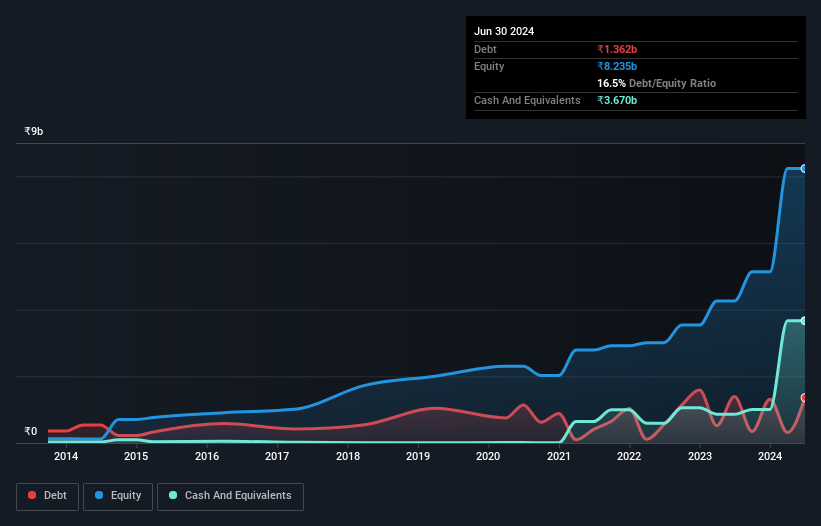Safari Industries (India) (NSE:SAFARI) Seems To Use Debt Quite Sensibly
Warren Buffett famously said, 'Volatility is far from synonymous with risk.' When we think about how risky a company is, we always like to look at its use of debt, since debt overload can lead to ruin. Importantly, Safari Industries (India) Limited (NSE:SAFARI) does carry debt. But the more important question is: how much risk is that debt creating?
What Risk Does Debt Bring?
Debt and other liabilities become risky for a business when it cannot easily fulfill those obligations, either with free cash flow or by raising capital at an attractive price. In the worst case scenario, a company can go bankrupt if it cannot pay its creditors. While that is not too common, we often do see indebted companies permanently diluting shareholders because lenders force them to raise capital at a distressed price. Having said that, the most common situation is where a company manages its debt reasonably well - and to its own advantage. When we examine debt levels, we first consider both cash and debt levels, together.
View our latest analysis for Safari Industries (India)
How Much Debt Does Safari Industries (India) Carry?
As you can see below, Safari Industries (India) had ₹1.36b of debt, at March 2024, which is about the same as the year before. You can click the chart for greater detail. But on the other hand it also has ₹3.67b in cash, leading to a ₹2.31b net cash position.

A Look At Safari Industries (India)'s Liabilities
The latest balance sheet data shows that Safari Industries (India) had liabilities of ₹2.31b due within a year, and liabilities of ₹895.8m falling due after that. Offsetting these obligations, it had cash of ₹3.67b as well as receivables valued at ₹1.79b due within 12 months. So it actually has ₹2.25b more liquid assets than total liabilities.
This state of affairs indicates that Safari Industries (India)'s balance sheet looks quite solid, as its total liabilities are just about equal to its liquid assets. So while it's hard to imagine that the ₹113.9b company is struggling for cash, we still think it's worth monitoring its balance sheet. Succinctly put, Safari Industries (India) boasts net cash, so it's fair to say it does not have a heavy debt load!
Fortunately, Safari Industries (India) grew its EBIT by 7.3% in the last year, making that debt load look even more manageable. When analysing debt levels, the balance sheet is the obvious place to start. But ultimately the future profitability of the business will decide if Safari Industries (India) can strengthen its balance sheet over time. So if you're focused on the future you can check out this free report showing analyst profit forecasts.
Finally, while the tax-man may adore accounting profits, lenders only accept cold hard cash. While Safari Industries (India) has net cash on its balance sheet, it's still worth taking a look at its ability to convert earnings before interest and tax (EBIT) to free cash flow, to help us understand how quickly it is building (or eroding) that cash balance. In the last three years, Safari Industries (India)'s free cash flow amounted to 28% of its EBIT, less than we'd expect. That's not great, when it comes to paying down debt.
Summing Up
While we empathize with investors who find debt concerning, you should keep in mind that Safari Industries (India) has net cash of ₹2.31b, as well as more liquid assets than liabilities. On top of that, it increased its EBIT by 7.3% in the last twelve months. So we don't have any problem with Safari Industries (India)'s use of debt. The balance sheet is clearly the area to focus on when you are analysing debt. But ultimately, every company can contain risks that exist outside of the balance sheet. For example, we've discovered 2 warning signs for Safari Industries (India) that you should be aware of before investing here.
At the end of the day, it's often better to focus on companies that are free from net debt. You can access our special list of such companies (all with a track record of profit growth). It's free.
New: Manage All Your Stock Portfolios in One Place
We've created the ultimate portfolio companion for stock investors, and it's free.
• Connect an unlimited number of Portfolios and see your total in one currency
• Be alerted to new Warning Signs or Risks via email or mobile
• Track the Fair Value of your stocks
Have feedback on this article? Concerned about the content? Get in touch with us directly. Alternatively, email editorial-team (at) simplywallst.com.
This article by Simply Wall St is general in nature. We provide commentary based on historical data and analyst forecasts only using an unbiased methodology and our articles are not intended to be financial advice. It does not constitute a recommendation to buy or sell any stock, and does not take account of your objectives, or your financial situation. We aim to bring you long-term focused analysis driven by fundamental data. Note that our analysis may not factor in the latest price-sensitive company announcements or qualitative material. Simply Wall St has no position in any stocks mentioned.
About NSEI:SAFARI
Safari Industries (India)
Designs, manufactures, and markets luggage, backpacks, and travel accessories in India.
Flawless balance sheet with reasonable growth potential.
Similar Companies
Market Insights
Community Narratives




